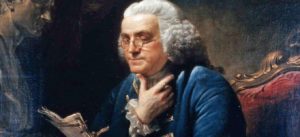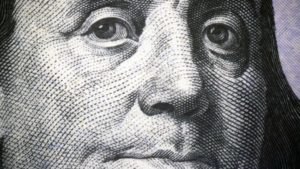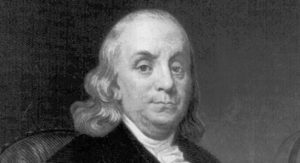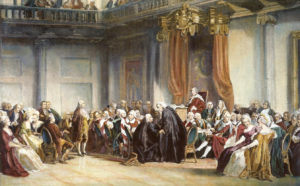Benjamin Franklin was an American polymath and one of the Founding Fathers of the United States. Franklin was a leading author, printer, political theorist, politician, freemason, postmaster, scientist, inventor, humorist, civic activist, statesman, and diplomat. Take a look below for 30 more fascinating and interesting facts about Benjamin Franklin.
1. As a scientist, he was a major figure in the American Enlightenment and the history of physics for his discoveries and theories regarding electricity.
2. As an inventor, he is known for the lightning rod, bifocals, and the Franklin stove, among other inventions.
3. He founded many civic organizations, including Philadelphia’s fire department and the University of Pennsylvania.
4. Franklin earned the title of “The First America” for his early and indefatigable campaigning for colonial unity, initially as an author and spokesman in London for several colonies.
5. As the first United States Ambassador to France, he exemplified the emerging American nation.

6. He was foundational in defining the American ethos as a marriage of the practical values of thrift, hard work, education, community spirit, self-governing institutions, and opposition to authoritarianism both political and religious, with the scientific and tolerant values of the Enlightenment.
7. Franklin became a successful newspaper editor and printer in Philadelphia, the leading city in the colonies, publishing the Pennsylvania Gazette at the age of 23.
8. He became wealthy publishing the Pennsylvania Gazette and Poor Richard’s Almanack, which he authored under the pseudonym Richard Saunders.
9. After 1767, he was associated with the Pennsylvania Chronicle, a newspaper that was known for its revolutionary sentiments and criticism of British policies.
10. He pioneered and was the first president of the Academy and College of Philadelphia, which opened in 1751 and later became the University of Pennsylvania.
11. He organized and was the first secretary of the American Philosophical Society and was elected president in 1769.
12. Franklin became a national hero in America as an agent for several colonies when he spearheaded an effort in London to have the Parliament of Great Britain repeal the unpopular Stamp Act.

13. An accomplished diplomat, he was widely admired among the French as the American minister to Paris and was a major figure in the development of positive Franco-American relations.
14. His efforts proved vital for the American Revolution in securing shipments of crucial munitions from France.
15. He was promoted to deputy postmaster-general for the British colonies in 1753, having been the Philadelphia postmaster for many years, and this enabled him to set up the first national communications network.
16. During the American Revolution, he became the first United States Postmaster General.
17. He was active in community affairs and colonial and state politics, as well as national and international affairs.
18. From 1785 to 1788, he served as governor of Pennsylvania.
19. He initially owned and dealt in slaves but, by the 1750s, he argued against slavery from an economic perspective and become one of the most prominent abolitionists.
20. Franklin spent just two years attending Boston Latin School and a private academy before joining the family candle and soap making business.

21. By the age of 12, he was serving as an indentured apprentice at a printing shop owned by his brother, James.
22. Young Benjamin Franklin made up for his lack of schooling by spending what little money he earned on books, often going without food to afford new volumes.
23. He would regularly read essays and articles and then rewrite them from memory.
24. After his brother James founded a weekly newspaper called the New England Courant in the 1720s, a 16 year old Franklin began secretly submitting essays and commentary as Silence Dogood, a fictitious widow who offered homespun musings on everything from fashion and marriage to women’s rights and religion.
25. Franklin arrived in Philadelphia in 1723 practically penniless, but over the next two decades he became very wealthy as a print shop owner, land speculator and publisher of the popular Poor Richard’s Almanack.
26. By 1748, the 42 year old Franklin was rich enough to stop working at his printing shop and become a “gentleman of leisure.”

27. Franklin’s retirement allowed him to spend his remaining 42 years studying science and devising inventions such as the lightning rod, bifocal glasses and a more efficient heating stove.
28. Among Franklin’s more unusual inventions is his “glass armonica,” an instrument designed to replicate the otherworldly sound that a wet finger makes when rubbed along the rim of a glass.
29. Franklin was among the last of the founding fathers to come out in favor of full separation from Britain.
30. Along with the two children he had with his wife, Deborah Read, Franklin also fathered an illegitimate son named William around 1730. The two were once close friends and partners, William helped Franklin with his famous kite experiment, but they later had a major falling out over the American Revolution as his son was a British loyalist.





One Comment
Pingback:
June 15, 2018 at 1:06 pm